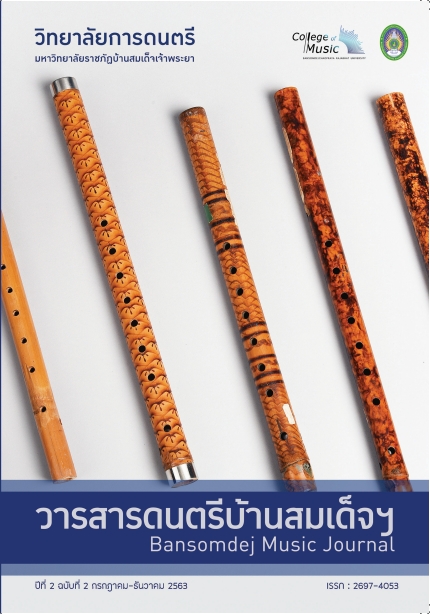ดนตรี เพื่อเจ็ดทักษะความฉลาด
คำสำคัญ:
ดนตรี, ความฉลาด, พัฒนาการ, คุณภาพชีวิตบทคัดย่อ
สำหรับครอบครัวในยุคสมัยปัจจุบัน หนึ่งในสิ่งสำคัญที่น่าเป็นห่วงคือ การอบรมบ่มเพาะอย่างไรให้เด็กสามารถเติบโตไปอยู่ร่วมในสังคมได้อย่างมีคุณภาพชีวิตที่ดีและมีความสุข ท่ามกลางสังคมยุคใหม่ที่มีปัจจัยและสิ่งกระตุ้นมากมายให้เด็ก ๆ มีความคิดและความเชื่อมั่นที่แตกต่างออกไป แต่ความคิดแปลกใหม่ที่เกิดขึ้นตามยุคสมัยมีทั้งสิ่งดีและไม่ดี การเรียนรู้ที่จะใช้ชีวิตและพัฒนาการทางด้านสมองเป็นสิ่งจำเป็นที่จะต้องศึกษาและพัฒนา โดยมีการฝึกฝนภาคปฏิบัติควบคู่กันไป ผู้เขียนจึงเห็นความสำคัญของกิจกรรมที่ส่งเสริมการพัฒนาทักษะความฉลาดที่สามารถให้ประโยชน์ได้ครบทุกด้าน ทั้งยังให้ความเพลิดเพลินสนุกสนาน เป็นกิจกรรมที่ดีที่ควรส่งเสริมให้กับทุกคน โดยเฉพาะในวัยเยาว์ซึ่งเป็นวัยแห่งการเรียนรู้เพื่อประโยชน์สูงสุด นั่นคือกิจกรรมการเรียนรู้เกี่ยวกับดนตรี จึงนำประโยชน์ของการศึกษาดนตรีมานำเสนอเพื่อให้เห็นถึงภาพรวมของประโยชน์ที่เกี่ยวกับพัฒนาการทางด้านสมอง ร่างกาย และจิตใจ และหวังเป็นอย่างยิ่งว่าดนตรีจะเป็นส่วนหนึ่งในชีวิต ที่ทำให้ทุกท่านที่ได้สัมผัสดนตรีนั้นมีความสุขและมีคุณภาพชีวิตที่ดี ไม่ว่าจะเป็นผู้ผลิตผลงาน ผู้เรียน หรือผู้ชม และเป็นส่วนช่วยในการส่งเสริมพัฒนาการในเด็กให้เติบโตเป็นผู้ใหญ่ที่มีคุณภาพในอนาคต
เอกสารอ้างอิง
Brancatisano, Olivia, Baird, Amee and Thompson, William Forde. (2020).
Why is music therapeutic for neurological disorders? The Therapeutic Music Capacities Model. [Online]. Available from: https://www.ncbi.nlm.nih.gov/pmc/articles/PMC6968490/. [20 August 2020].
Carrey Siu, Tik-Sze and Cheung, Him. (2017). Infants’ sensitivity to emotion in music and emotion-action understanding. [Online]. Available from: https://www.ncbi.nlm.nih.gov/ pmc/articles/PMC5289547/. [20 August 2020].
MacRitchie, Jennifer, Breaden, Matthew, J. Milne, Andrew and McIntyre, Sarah. (2020). Cognitive, Motor and Social Factors of Music Instrument Training Programs for Older Adults’ Improved Wellbeing. [Online]. Available from: https://www.fron-tiersin.org/articles/10.3389/fpsyg.2019.02868/full. [20 August 2020].
Martinez, Quiroga, Hansen, N.C., Højlund, A., Pearce, M., Brattico, E. and Vuust, P. (2019). Decomposing neural responses to melodic surprise in musicians and non-musicians : Evidence for a hierarchy of predictions in the auditory system. [Online]. Available from: https://reader.elsevier.com/ reader/sd/ pii/S1053811920303037?token=788AFD15D D66C
D88D9FEF723BF8BAE7AAD01AD77CDE52C2281DFC1179A954AA4FA4A24CFA1B656232585E22F3EA8646. [20 August 2020].
Robert, C. (1997). The Moral Intelligence of children. London: Boloombury.
Ross, Bernhard, Barat, Masihullah and Fujioka, Takako. (2017). Sound-Making Actions Lead to Immediate Plastic Changes of Neuromagnetic Evoked Responses and Induced β-Band Oscillations during Perception. The journal of Neuroscience. 37(24), 5948-5959.
Sackeim, H. A., Freeman, J., McElhiney, M., Coleman, E., Prudic, J., & Devanand, D. P. (1992). Effects of major depression estimates of intelligence. Journal of Clinical and Experimental Neuropsychology. 14(2), 268–288.
Schlaug, Gottfried, Norton, Andrea and Overy, Katie. (2005). Effects of Music Training on the Child’s Brain and Cognitive Development. [Online]. Available from: http://pdfs.
semanticscholar.org/7a49/c2c3aabc23ea60dd0938a0265e8a0028291a.pdf. [20 August 2020].
Y. Wan, Catherine and Schlaug, Gottfried. (2010). Music Making as a Tool for Promoting Brain Plasticity across the Life Span. Neuroscientist. 16(5), 566-567.
Yurgil, Kate A., Velasquez, Miguel A., Winston, Jenna L., Reichman, Noah B. and Colombo, Paul J. (2020). Music Training, Working Memory, and Neural Oscillations : A Review. [Online]. Available from: https://www.frontiersin.org/ articles/10.3389/fpsyg.2020.00266/full. [20 August 2020].
ดาวน์โหลด
เผยแพร่แล้ว
รูปแบบการอ้างอิง
ฉบับ
ประเภทบทความ
สัญญาอนุญาต

อนุญาตภายใต้เงื่อนไข Creative Commons Attribution-NonCommercial-NoDerivatives 4.0 International License.





